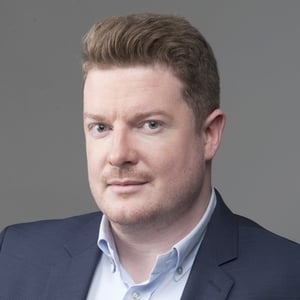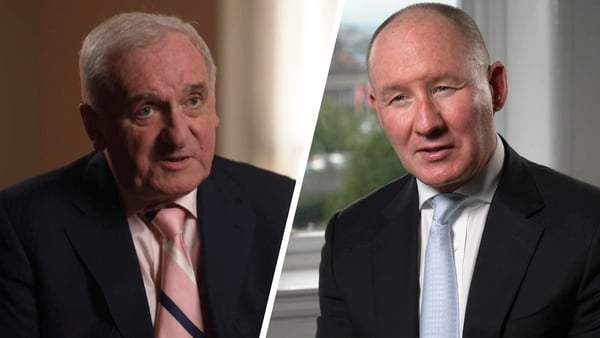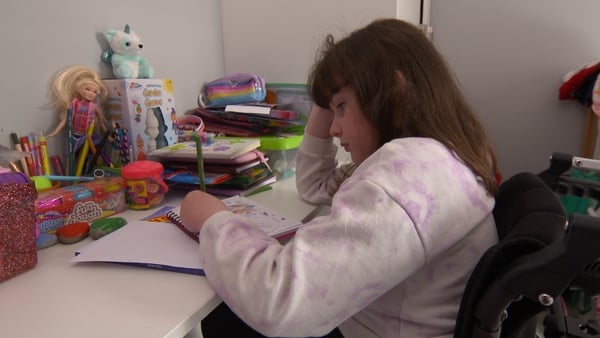In July, former US intelligence officer David Grusch sat in front of a congressional hearing and told assembled lawmakers that he was certain that the US government had in its possession the wreckage of crashed alien space craft and "non-human" biologics.
The Pentagon denied Mr Grusch’s claims that it had covered up a "multi-decade" program which retrieved, and reverse engineered, crashed UFOs.
Two months later, Mexican congress was presented with the mummified remains of what it was told were ancient alien lifeforms.
There was no verified evidence that these bodies were extraterrestrials, just as Mr Grusch could provide no evidence other than his own claims about what other officials had told him.
Nevertheless, here were the legislative branches of two countries, one a world superpower, considering the question of whether our planet had been visited by aliens. The UFO phenomenon was sharply back in focus.
For obsessives, or even those who maintain an interest, consuming UFO-related material has changed massively since the advent of social media. This is also true for those providing the material.
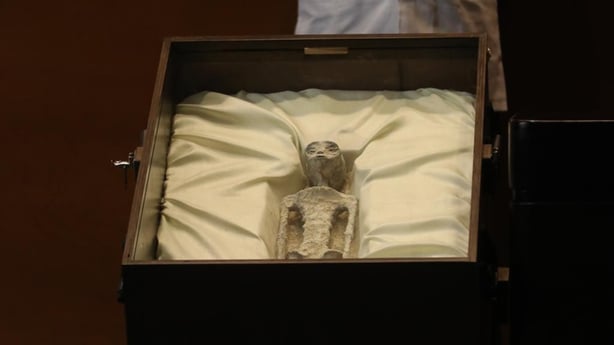
Kelly Chase hosts the 'UFO Rabbit Hole Podcast'. She left her job in corporate communications in January to pursue it full time.
Ms Chase told Prime Time she believes David Grusch should be taken seriously, based on the credibility his previous position as a US intelligence officer gives him.
"He had extremely high security clearances. This is the person who we have been entrusting for the last few years to compile the UAP [Unidentified Anomalous Phenomenon] reports that are being delivered to the president," Ms Chase says
"Up until he became a whistleblower, this is someone who the government trusted as well."
This doesn’t mean people should take all of what he says at face value or that we should automatically believe it, she added.
Mick West, who has written on conspiracy theories and debunking hoaxes for several decades, is of the opposite view.
"I think he is telling the truth as he knows it. Mark Milley, the chairman of the Joint Chiefs of Staff, the highest-ranking military officer in the United States, has said this, that he thinks that David Grush is telling the truth as he understands it. But that doesn't mean what he's saying is accurate," Mr West says.
"He has been told things by other people. He’s perhaps been shown things by other people. And he's not really given us very many details."
Regardless of credibility, UFO enthusiasts were hugely encouraged by Congress giving him a platform.
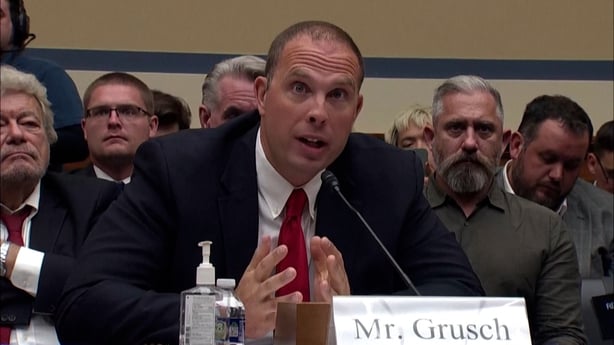
On a Sunday afternoon in November, around 20 of Ms Chase’s podcast subscribers, mostly, but not exclusively American, join a Zoom call for a chat. For a group unified by their belief in UAPs, which stands for unidentified anomalous phenomena, the modern term for UFOs, it is not an echo chamber.
Some are "experiencers", who say they’ve had first-hand experience of an alien encounter.
For others, UFOs have become analogous with religious faith, while others have rediscovered religious faith through their interest in the phenomenon.
Some are looking for answers. Many say they know that they’ll probably never find an answer, but their exploration of this subject has given them a purpose.
Many of them believe that the US government has lied about the subject for years and is covering something up.
Several of them cite a series of New York Times articles from 2017 revealing a secret Pentagon UFO programme, though these articles only revealed that the Pentagon had for years been investigating reports of UFOs.
The year 2017 was a turning point for others too. It was the year that Oumuamua was discovered - a long, cigar-shaped rock, about the size of a football field and the first ever interstellar object observed in our own solar system.
Professor Avi Loeb was the longest-serving chair of Harvard University’s astronomy department, where he is still a Professor of Science.
His work had centred around astrophysics and black holes but the shape and movement of Oumuamua made him want to take a closer look.
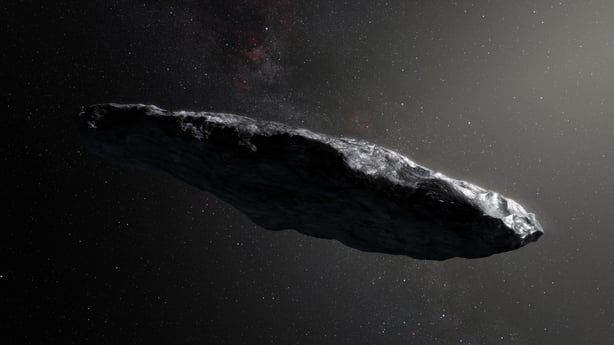
Speculating that it could be a piece of extraterrestrial technology, he pivoted his career toward finding solid, scientific evidence of extraterrestrial life.
"I decided this is an extremely important problem and I don't have much time left for my scientific career, so I better focus on it," Prof Loeb says.
"The public is very interested in the question, are we alone? If we find that there is a more intelligent student in the class of civilizations in the solar system, then we could learn from it. So, I think it's the most important question that we can address."
Prof Loeb has since established the Galileo Project, which aims to capture high-quality images of UFOs.
He’s also attempting to identify and recover potential interstellar meteors that have landed on earth.
Earlier this year, he chartered a ship to drag a giant magnet across the bed of the Pacific Ocean. His thinking is that these meteors could be made up of or contain extraterrestrial technologies from long-dead civilisations - ancient space junk that may have drifted for billions of years before arriving here.
It’s at odds with the more conventional methods used to try to find evidence of intelligent life elsewhere in the universe.
Search for Extraterrestrial Intelligence (SETI) programmes tend to use radio telescopes to listen for signals from distant planets. Prof Loeb believes this is like waiting for a phone call when we should be looking for packages in our mailbox.
To date, neither Prof Loeb nor the SETI programmes have delivered verifiable evidence of intelligent life or to back the theory that we are not alone in the universe.
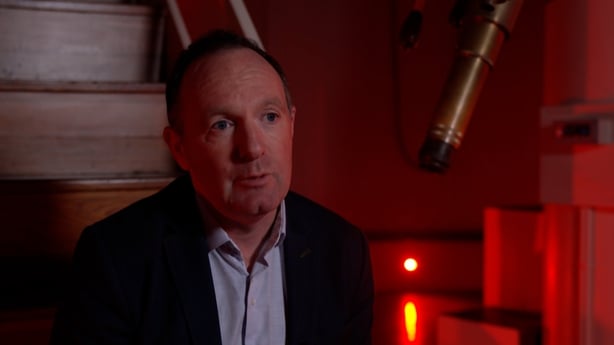
Professor Peter Gallagher, Head of Astrophysics at the Dublin Institute for Advanced Studies, says the likelihood is that other planets with life do exist.
"The question is whether or not it's complex life or it's intelligent life. And then the question becomes, can we communicate with it? Can we listen to them, or can they hear us? And we have no evidence for that as yet," he says.
There is a distinction between surmising that we’re not alone in the universe and the key tenet of UFO enthusiasts’ belief that aliens are visiting us, monitoring us and that evidence of their existence is being suppressed by national governments, particularly the US government.
Both Prof Loeb and Prof Gallagher agree that the idea of biological aliens visiting this planet is scientifically impossible, owing to the time required to travel the notional distances to get here and the power that would be needed to fuel such a journey.
So, why does the belief persist, despite the lack of evidence and scientific improbability?
Cyber-psychology researcher Dr Nicola Fox Hamilton told Prime Time it’s an example of conspiratorial thinking. She says there are many reasons why people believe in conspiracy theories.
"They feel maybe powerless or anxious about the world, and they're seeking out some sort of meaning and maybe don't have the cognitive abilities to kind of review complex information and come up with rational answers. And so they seek out more esoteric answers," Dr Fox Hamilton says.
Dr Fox Hamilton says social media plays a key role in fuelling modern conspiracy theories.
"I think there's a lot more overlap between conspiracy theories now because of the internet and because of the way people interact...if you believe one, you're more likely to believe more than one," she says.
The more time people spend online, she says "the more removed they are from a reality check offline because they're spending all their time surrounded by people who also believe in these beliefs and it starts to erode reality and factual thinking as well," Dr Fox Hamilton says.
The overlap of interest in UFOs and other conspiracy theories is something that Kelly Chase and her listeners are very much aware of.
"I think that there actually really is danger," she says. "It's really important to not settle on any answers in particular [and] to keep an open mind."
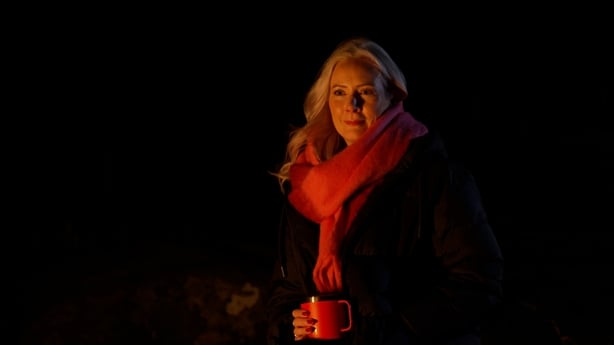
Meanwhile, Prof Loeb says it’s important to follow the science, which is why he’s trying to find verifiable evidence of alien technology.
"All one needs is a high-resolution image that shows an object which is clearly not natural in origin. Another possibility is to find a gadget at the bottom of the ocean that came from an interstellar meteor," he says.
Mick West is sceptical that Prof Loeb's theory will produce the desired results, saying that every camera, even the most technically advanced, will have a "low-information zone", where objects just outside its capabilities will remain blurred.
"The low information zone will just be further away, and he'll get a bunch of blurry photos of things that are unidentified, and those will be the newer UFOs, and they're just UFOs that are a bit further away now."
"I’d love to be proven wrong, but history has kind of shown us that if you get further into the low information zone, aliens don't come out," Mr West says.
Modern science has utterly transformed our understanding of the universe and what’s out there, says Prof Gallagher. He’s optimistic that the work being carried out now to discover extraterrestrial life will yield a groundbreaking discovery.
"I would hope that we continue to search, I hope that we continue to probe as far as humans can and maybe, just maybe, there's a small chance that we will detect it," Prof Gallagher says.
"That's what human beings do. We came out of our caves, we light fires, we go over the hill, we go across the ocean, we peer into the distant universe and that's what makes us human."

